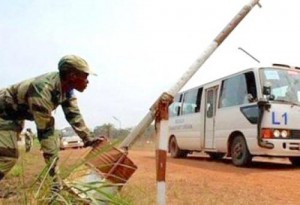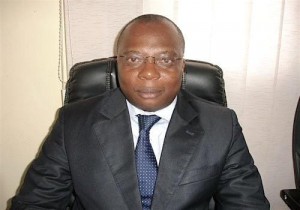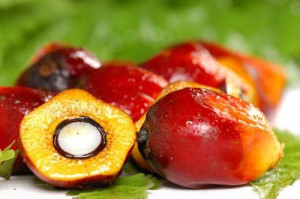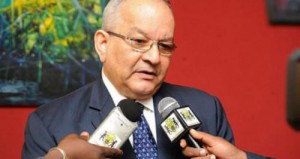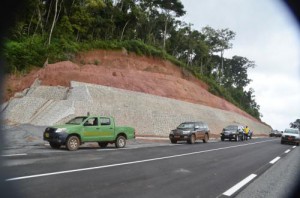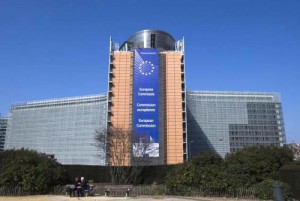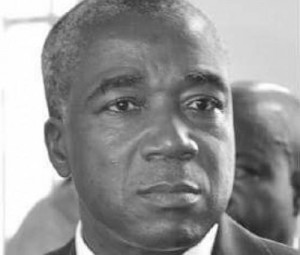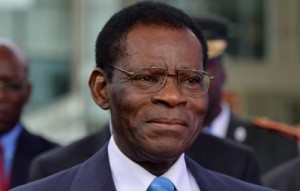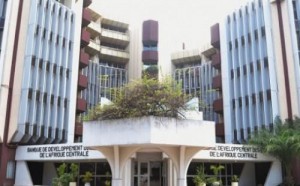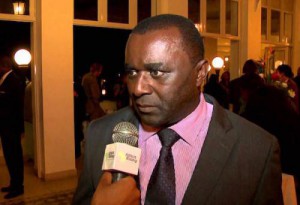
Cameroon solicits FCFA 3 billion from the European Union to secure its borders
The Cameroonian Minister of Economy, (Minepat) Louis Paul Motaze, and the Secretary General (SG) of the Central African Economic Community (CEEAC), Ahmad Allam-Mi exchanged on 5 April in Yaoundé, on “CEEAC’s Border Programme”.
Regarding this “CEEAC Border Program” which was the subject to the request sent by the Minepat on 10 March 2017, Ahmad Allam-Mi acknowledged receipt and reassured Mr Motaze that his request for funding to replenish the Special Allocation Fund, with 5 million Euros (FCFA 3.275 billion), was received by the General Secretariat of CEEAC.
Mr Allam-Mi subsequently indicated that this request was approved by the General Secretariat who made a request to the European Union delegation on 27 March 2017. The SG pointed out that the amount, 5 million Euros, would be taken from the priority area “Political integration and cooperation in terms of peace and security” of the 11th European Development Fund for Central Africa.
The SG estimated that for a better integration in the “CEEAC Border Programme”, it is preferable that the action be developed so as to support in priority, management and security operations at the Cameroon-Nigeria border with a larger geographic reach also covering Chad and the Central African Republic.
Sylvain Andzongo
Central Africa wishes to optimise efficiency of management of 11th European Development Fund
In preparation for the conference of the national and regional Authorising officers of the European Development Fund (EDF) in the Central Africa region, scheduled for 6 and 7 April 2017 in Yaoundé, a preparatory meeting of experts from the Member States of the Economic Community CEMAC, EU and the Secretariat of the group of African, Caribbean and Pacific states (ACP) was held on April 4 in the Cameroonian capital.
This preparatory meeting, highlighted Charles Assamba, managing director of Cooperation and Regional Integration in the Cameroonian Ministry of Economy, aims to prepare, based on technical discussions, the dossiers to be submitted for decisions and resolutions of the national and regional authorising officers. Specifically, the participants will reflect on the mechanisms and appropriate tools to consolidate and intensify the efforts of the 11th EDF in its different components of intervention, both at the national and regional level.
The issues on the table: the review of implementation of national indicative programmes and the regional indicative programme, and the examination of the new European consensus on the development of ACP states; putting the accent on the promotion of a dynamic private sector and the implementation of Sustainable Development Goals. This meeting also allowed several problems undermining ACP states to be tackled, especially, stability and the fight against the root causes of illegal migration and the phenomenon of displaced persons.
For his part, Henrique Banze, Assistant Secretary General of the Group of ACP states, pleaded above all for the strengthening in the coherence and complementarity between the national indicative programmes and that of the regional programme. This in the interest of development of the Central African region. As a reminder, the financing agreement of the indicative regional programme of Central Africa relating to the 11th EDF was signed in June 2015 in Brussels (Belgium). For an overall total amount of 350 million euros (FCfa 229.25 billion), this Fund which prioritises basic infrastructure, is structured around three main components. Namely, political integration and cooperation in matters of peace and security; economic and commercial integration. As well as sustainable management of natural resources and biodiversity.
S.A
Central Africa has strategy of sustainable development of palm oil sector
The General Secretariat of the Economic Community of Central African States (CEEAC) in partnership with World Wildlife Fund (WWF) assembled on 30 and 31 March in Yaoundé, about thirty organisations and businesses in the sub region who approved a Regional Strategy Document for Sustainable Development in the palm oil sector.
The opportunity of such an initiative, noted Ludovic Miaro, WWF representative, results from the fact that, the Central African states are tackling a serious problem of deficit (>50%) in palm oil and are resorting to imports from South Asian countries to satisfy national demand. Thus, the document signed in Yaoundé is one of the solutions to rectify the deficit situation in the sub region while limiting the ecological impact of this sector on the high conservation value forests, the loss of bio diversity and subsistence means of local communities. This Strategy will be transmitted to the Conference of Ministers of CEEAC in charge of Agriculture and Forests with a view to its adoption during the year 2017. To the States, the participants (Socapalm, CDC, Palmol, BAD, FAO, Olam Gabon, Comifac, etc.) recommended providing an exhaustive list of the companies and professional organisations, both big and small producers of commodity sectors in general and that of palm oil in particular. But equally to associate the Development Bank of Central African States (Banque de Développement des Etats de l’Afrique centrale - BDEAC) and local banks financing this sector.
Furthermore, it was recommended that CEEAC study the possibility of elaborating a sub-regional strategy on the development of eco-agriculture on all the industrial farming in the agro-ecological zones (cotton, shea, cocoa, coffee, tea, etc.) in line with the CEEAC Common Agricultural Policy. Without forgetting to mobilise institutions and existing sub-regional and international financial tools in order to finance eco-agriculture while integrating the strategy of the palm oil sector.
Sylvain Andzongo
Making the Regional Animal Health Centre operational in Central Africa
The General Secretary of the Economic Community of Central African States (CEEAC), Ahmad Allam-Mi, received on 30 March in Libreville, the former Director of the African Union’s Inter-African Bureau of Animal Resources (AU-IBAR), Modibo Traoré, as consultant on the implementation process to make the Central African Regional Animal Health Centre operational (CRSA-AC).
Regarding the location of the Centre, Ahmad Allam-Mi supported the idea of turning the offices of the Commission économique du bétail, de la viande et des ressources halieutiques (Cebevirha - Livestock, Meat and Fisheries Economic Commission) into the headquarters of the Central African Regional Animal Health Centre. “Considering the ongoing streamlining process between CEEAC and CEMAC, using the headquarters of Cebevirha would only be a plus for CEEAC as it would enable us to extend the activities to the other four CEEAC members who are not CEMAC members, namely: Angola, DR Congo, Sao Tomé & Principe and Rwanda”, indicated Ahmad Allam-Mi.
Chad will host said Centre. And to show good will, Ndjamena promised to offer all the amenities and benefits to the future management of CRSA-AC.
S.A
Partial delivery of Brazzaville-Yaoundé corridor
The Secretary General of the Ministry of Public Works, Philémon Zo’o Zame, took delivery at the end of February of the Djoum-Mintom road stretch (98 km) as part of the project to develop the Ketta-Djoum lot 2 road, integrated in the transport facilitation project on the Brazzaville-Yaoundé corridor (Congo-Cameroon).
“The construction of the Djoum-Mintom road approved without reservations should be a great source of satisfaction for the company as progressing in the works in this area which is particularly uneven and deep into the equatorial forest with a high index of rainfall was not an easy task”, praised Philémon Zo’o Zame. The geometrical features of the work are those of a road with a 7.5m large pavement and two shoulders covered with double surface dressings of 2.00m each. The reference speed is 60 km/hour on hilly surfaces and 80 km/hour on flat surfaces.
With 91.7% of the funding from the African Development Fund (ADF) and 8.3% from the Cameroonian government, this section of the corridor required a total of FCfa 55.396 billion. This important road will substantially improve the living conditions of populations in the different towns through which the project passes. Already, the aspect of several villages really changed with the construction of several adjoining structures.
Opening up this area will promote economic development with not only the sale of agricultural products, but also facilitate movements between the towns of Djoum and Mintom as well as heavy load truck traffic from Congo Brazzaville coming to discharge their goods at the Douala Port.
S.A
CEMAC invites European Union to re-joinnegotiations on Economic Partnership Agreement
Though the European Union withdrew from the negotiations on the Economic Partnership Agreement (EPA) with the Central African Economic and Monetary Community (CEMAC) for some months now, ministers of Economy in this zone met during the 16th session of the EPA’s Ministry Negotiations Committee (COMINA) in Douala, on 03 March 2017.
The ministers took note of the presentation made by Cameroon on the current tariff dismantling phase for European products, started since 04 August 2016. Indeed, said current dismantlement only concerns products of the first group made of 1,760 tariff lines. This group essentially comprises products for household use (30% of the total group), raw materials (19%), and some equipment (27%).
At the end of the discussions, the ministers decided “not to adhere to the stage Agreement as is, and to continue negotiating for a complete regional EPA, under procedures to be defined at a later date”. In this respect, COMINA decided to agree with the European side to organise a high level meeting dedicated to political dialogue, in accordance with Article 8.3 of the Revised Cotonou Agreement.
Based on the explanations of the (outgoing) President of the CEMAC Commission, Pierre Moussa, “the Cotonou Agreement clearly specifies that the main objective of any commercial agreement of the EPA type must be development and that negotiations must be characterised by the flexibility and respect of the partnership. However the manner in which the European Commission negotiates EPA with the Central African region runs counter to the rules and spirit of the Cotonou Partnership”. In fact, while closing the door on negotiations with CEMAC, the European Union nevertheless provided a remedy according to which, countries in the community desirous of signing the Agreement must align themselves with the document endorsed by Cameroon. Which is what CEMAC refuses to do.
Regarding the conditions to restart the cooperation between the European Union and the Republic of Equatorial Guinea, the ministers restated “their leanings suggesting that the cooperation between the EU and Equatorial Guinea resumes for the benefit of this country and the Central African region. This decision, which is the sole responsibility of the concerned country, should without doubt take into consideration the current trend of withdrawal from the International Criminal Court happening across the African continent”.
Sylvain Andzongo
Cameroonian Dieudonné Evou Mekou officially takes office as Vice-Governor of BEAC
The reign of Equatorial-Guinean Lucas Abaga Nchama as head of the Central African States Bank (BEAC) officially ended on 5 February 2016. A day later, we learned from reliable sources, a handing-over ceremony took place at the headquarters of BEAC in Yaoundé, the Cameroonian capital during which Chadian Abbas Mahamat Tolli officially took the helm of the six CEMAC countries’ issuing institution (Cameroon, Congo, Gabon, Equatorial Guinea, Central African Republic and Chad).
In his new function at BEAC, the former President of BDEAC will be assisted by Cameroonian Dieudonné Evou Mekou, who also took office on the same day, as Vice-Governor. Just like Gabonese Désiré Guedon, the new Secretary General; Congolese Cédric Ondaye Ebauh, the brand new Chief Operating Officer; and Central African Bienvenu Marius Roosevelt Feimonanzoui, Managing Director, General Audit.
This new team, meant to preside over BEAC for the next seven years, comes at the head of a central bank whose financial situation has been fixed, but who is currently facing a drop in foreign exchange reserves, brought on by the drop in crude oil international prices, which five of the six Member-States produce.
BRM
Obiang Nguema Mbasogo, Equato-Guinean President, called a summit of CEMAC Heads of State on 17 February
At the request of Obiang Nguema Mbasogo, incumbent President and President of the Republic of Equatorial Guinea, an ordinary session of the conference of Heads of State of the Central African Economic and Monetary Community (CEMAC) will be held on Friday 17 February 2017 in Oyala, in Equatorial Guinea.
In that respect, the 31st ordinary session of the Council of Ministers of the Central African Economic Union (UEAC) is organised in Obiang Nguema’s country from 07 to 15 February 2017 to prepare the topics on the agenda of the Summit. At the opening of UEAC, the President of the Council of Ministers, Baltasar Engonga Edjo’o, indicated that, “this session will be mainly dedicated to analysing the budget bill and the plan of action for 2017, which was outlined during the last conference of UEAC Council of Ministers, in an environment where the progress of the economic crisis should remind us of the absolute necessity of implementing reforms in our economies in relation with the oil sector”. He also noted that it is time for the countries in the community to complete some projects. Such as, the rationalisation of training schools and election of CEMAC members of parliament by indirect vote.
Beyond the budget issue, the Vice-President of the CEMAC Commission, Rosario Mbasogo Kung Nguidang, also indicated that the conference should broach the subject of the continuation of the implementation of institutional reforms with the establishment of common courses, strengthening of customs union, with the case on free movement of people, the consolidation of the common market, with the progress in the negotiations for the Economic Partnership Agreement between Central Africa and the European Union. Including cleaning the community’s public finance, with the progress in the implementation of the CEMAC public management harmonised framework’s directives.
S.A
The capital of BEAC within the BDEAC moved from 6 to 33% between 2010 and 2016
As the Governor of the Bank of Central African States (BEAC), Luvas Abaga Nchama, is stepping down in favour of Chadian Mahamat Tolli, his review shows that the Central Bank increased its shareholding in the capital of the Central African Development Bank (BDEAC) from 6 to 32%.
Which means that out of the BDEAC’s capital of FCfa 1,200 billion, BEAC currently owns shares amounting to FCfa 401.1 billion. Lucas Abaga Nchama reminds that it is through the Central Bank that BDEAC raised its capital from FCfa 400 billion in 2010 to the current FCfa 1,200 billion. The six countries in the Economic and Monetary Central African Community (CEMAC) each own 8.48% in the capital of the sub-region’s Development Bank. Thus FCfa 107.7 billion respectively for Cameroon, Central African Republic, Congo, Gabon, Equatorial Guinea and Chad.
The African Development Bank (AfDB) owns 3.38% (FCfa 40.5 billion) in the capital of BDEAC. France 4.23%, Kuwait 0.08% (FCfa 1 billion) and Libya 1.67% (FCfa 20 billion).
S.A
Despite the oil crisis, the volume of foreign exchange reserves of the CEMAC States remains comfortable, according to BEAC Governor
Talking on 25 January 2017 in Yaoundé, on the fringes of a “high level conference” on the answers the central banks must bring to the exogenous shocks, Lucas Abaga Nchama, Governor of the Central Bank of the six CEMAC States, tried to reassure on the volume of foreign exchange reserves the countries in this community currently have.
“The currency coverage rate is slightly lower than 70% at the moment, while the minimum is 20%. Before, we were around 100%”, he indicated, pleased with the efforts made by the CEMAC States to adjust”, in the face of an oil crisis which has been crippling most economies in the sub-region.
Lucas Abaga Nchama appeared even more optimistic on the situation of these foreign exchange reserves as, he specified, “the 21 measures taken by the CEMAC Heads of State during the 23 December 2016 extraordinary summit in Yaoundé, are in line with the monetary stability in the sub-region”.
As a reminder, this Equatorial Guinean cadre was thus making his last official appearance as BEAC Governor, as in the coming days, he will be replaced by Chadian Abbas Mahamat Tolli.
BRM
Mags frontpage
- Most read 7 days
- shared 1 month
- read 1 month


